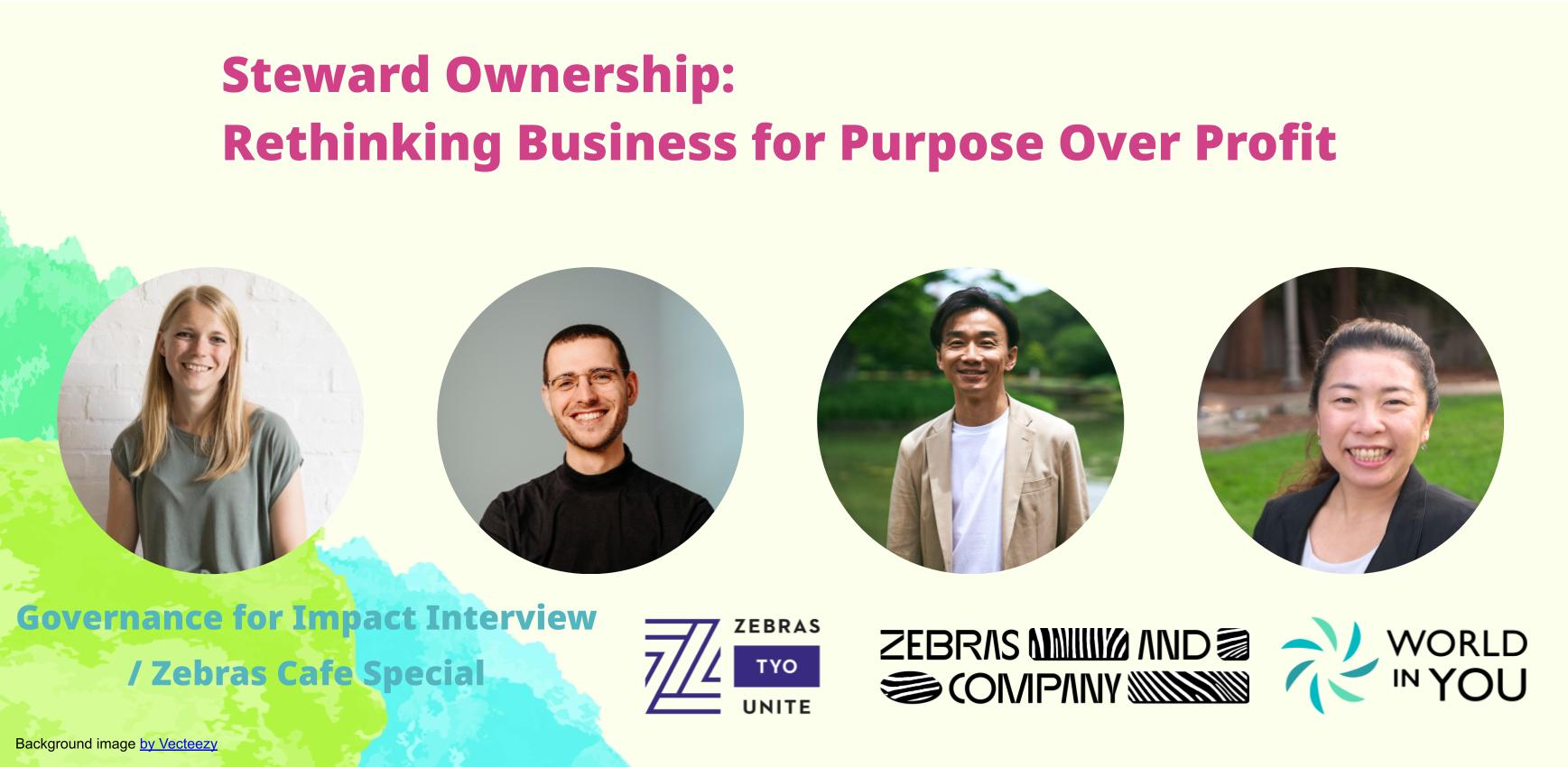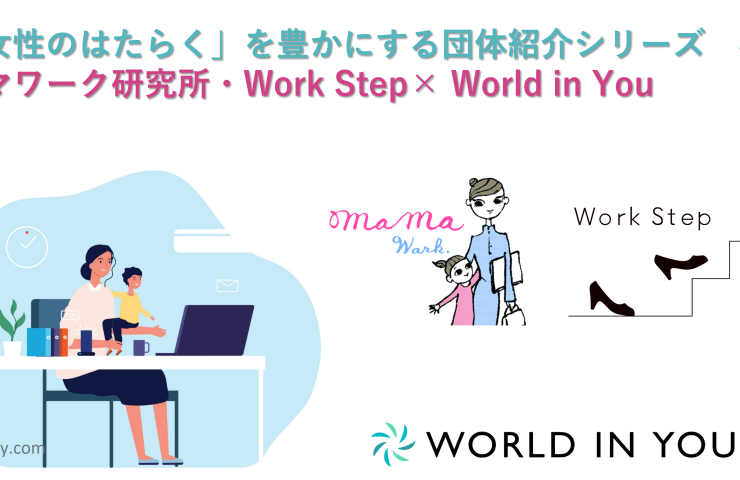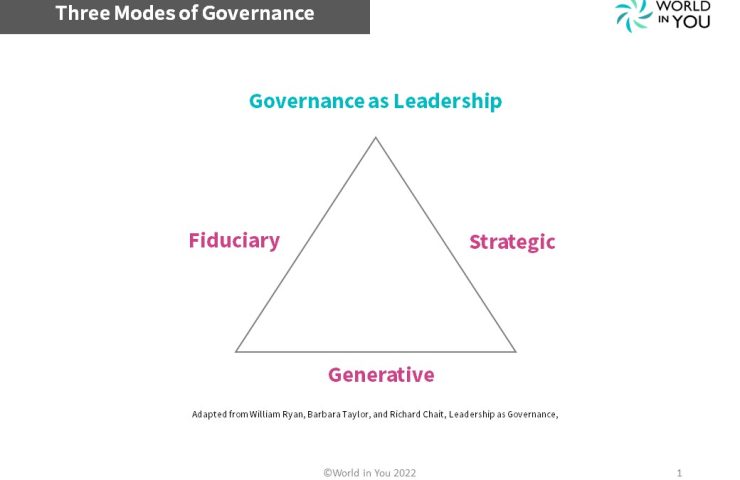Steward Ownership: Rethinking Business for Purpose Over Profit

In March 2024, World in You, in collaboration with Tokyo Zebras Unite/Zebras and Company, hosted an event as part of the Governance for Impact Interview Series and a special edition of Zebras Cafe."
This event featured speakers from Europe who shared their experiences and insights on Steward Ownership, an innovative approach to business governance that prioritizes purpose over short-term profits and challenges traditional notions of company ownership.
The full conversation is available on YouTube for those interested in delving deeper into the topic.
Featured Speakers
Annika Schneider
Lead International Partnerships, PURPOSE
 As a business graduate, Annika has repeatedly encountered an economic system that prioritizes profits above all else, where employees are viewed as interchangeable resources, and founders are deemed successful only if they achieve astronomical wealth through an exit. Tired of this one-dimensional narrative and committed to fostering an economy that benefits people and the planet, Annika joined PURPOSE in 2019. She spearheads Purpose’s international partnerships, collaborating with entrepreneurs worldwide. Annika is profoundly passionate about the transformative potential of steward-ownership to tackle systemic issues and infuse workplaces globally with renewed vigor and proactivity.
As a business graduate, Annika has repeatedly encountered an economic system that prioritizes profits above all else, where employees are viewed as interchangeable resources, and founders are deemed successful only if they achieve astronomical wealth through an exit. Tired of this one-dimensional narrative and committed to fostering an economy that benefits people and the planet, Annika joined PURPOSE in 2019. She spearheads Purpose’s international partnerships, collaborating with entrepreneurs worldwide. Annika is profoundly passionate about the transformative potential of steward-ownership to tackle systemic issues and infuse workplaces globally with renewed vigor and proactivity.
Stephan Schenk
Founder, Stapelstein®
 Stephan Schenk is the inventor, founder and steward-owner of Stapelstein®. Stapelstein® creates moving living environments and thus shapes the lives of children and those around them. In 2022, Stapelstein® became steward-owned with the help of the Purpose Stiftung (Purpose Foundation).
Stephan Schenk is the inventor, founder and steward-owner of Stapelstein®. Stapelstein® creates moving living environments and thus shapes the lives of children and those around them. In 2022, Stapelstein® became steward-owned with the help of the Purpose Stiftung (Purpose Foundation).
The Problem with Traditional Ownership
Annika Schneider, Lead International Partnerships at PURPOSE, opened the discussion by highlighting two problematic principles inherent in our current economic system:
- Money Buys Power: Investors with capital gain significant control over companies.
- Companies Exist Primarily to Maximize Shareholder Value: This often leads to prioritizing short-term profits over long-term sustainability and social impact.
These principles have led to numerous paradoxical effects, including resource depletion, growing inequality, and concentration of wealth and power.
Steward Ownership: A New Approach
Steward Ownership proposes a fundamental shift in how companies are owned and governed. At its core, this model introduces a crucial innovation: the unbundling of voting rights and economic rights, which are traditionally bundled together in conventional ownership structures.
In traditional models, shareholders typically possess both voting rights (control over company decisions) and economic rights (entitlement to profits and appreciation in company value). This bundling often leads to short-term profit-seeking behaviors that can compromise a company's long-term mission and social impact.
Steward Ownership, however, separates these rights:
- Voting Rights (Self-Determination Principle): These are assigned to individuals closely connected to the company's mission and operations - the "stewards." This ensures that decision-making power resides with those who are deeply invested in the company's purpose and day-to-day activities, rather than with external shareholders who may prioritize financial returns over the company's mission.
- Economic Rights (Purpose-Orientation Principle): While the company can still generate profits, these are seen as a means to achieve the company's purpose, not an end in themselves. Profits are primarily reinvested in the company, used to repay investors, or donated. The appreciation in the company's value is locked in for the benefit of the company's mission, rather than for the personal enrichment of shareholders.
This unbundling allows companies to maintain their independence and focus on their mission over the long term, free from the pressure to maximize short-term shareholder value or the risk of being sold to the highest bidder.
These principles are legally anchored to ensure long-term adherence, even as leadership changes over time. This legal structure varies by country but always aims to protect the company's purpose and independence.
Benefits of Steward Ownership
According to data from Denmark, where many steward ownership companies exist, this model can lead to:
- Improved long-term orientation and ESG performance
- Greater equity in society through better income distribution and opportunities
- A more decentralized economy with less concentration of wealth and power
Implementing Steward Ownership
PURPOSE, an organization dedicated to promoting and supporting steward ownership, helps companies implement this model through:
- Building narratives to increase awareness
- Developing legal frameworks suitable for different countries
- Providing financial support through investment funds
Case Studies
Stapelstein®
Stephan Schenk, founder of Stapelstein®, a German toy company, shared his journey of transitioning to Steward Ownership. Stapelstein® produces toys that encourage movement and play, addressing the critical issue of insufficient physical activity among children.
Initially structured as a traditional company with angel investors, Stapelstein® faced challenges:
- Mission-Investor Conflict: Investors demanded immediate profit distribution, conflicting with Schenk's desire to reinvest for greater impact.
- Decision-Making Challenges: The voting structure made it difficult to make decisions without approval from absent investors.
Recognizing these issues, Schenk partnered with the Purpose Foundation to transition to Steward Ownership. This allowed Stapelstein® to:
- Focus on Mission: Prioritize purpose over short-term profits.
- Maintain Independence: Make decisions aligned with long-term goals and values.
- Reinvest for Growth: Use profits to increase impact and reach.
The results have been remarkable: Stapelstein® is now a successful startup in the German and Central European toy industry, with products sold in over 60 countries and annual revenue of about 16 million euros. The company reports high employee satisfaction, as staff can work in a purpose-driven environment without external shareholder pressure.
This case study illustrates how steward ownership can empower companies to maintain their purpose-driven focus while achieving significant business success.
Eiji Press Inc.
In Japan, Eiji Press Inc. has also embraced steward ownership principles. The company implemented a unique approach using the golden share model. This model involves issuing a special class of shares (golden shares) that are held by a non-profit organization composed of Eiji Press employees. These golden shares give the organization veto power over any changes to the company's purpose, ensuring that the company's mission remains protected even as ownership changes over time.
Conclusion
Steward ownership, with its innovative unbundling of voting and economic rights, offers a promising alternative to traditional business models. It allows companies to prioritize their mission and long-term impact over short-term profits. As more businesses adopt this approach across different countries and legal frameworks, it has the potential to create a more equitable, sustainable, and purpose-driven global economy.
◆Contact us















